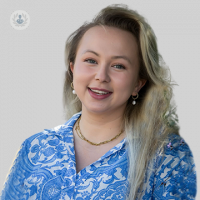A quick guide to mood disorders
Escrito por:Mood disorders, also known as affective disorders, are a group of conditions where a person's emotional state is distorted or inconsistent with their circumstances and interferes with their ability to function. They are prevalent and can significantly impact one's quality of life. In her latest online article renowned clinical psychologist Dr Emily Hale provides patients with clear and concise information about mood disorders, their symptoms, and treatment options.

Common types of mood disorders
Major depressive disorder (MDD)
Major Depressive Disorder, commonly referred to as depression, is characterized by a persistent feeling of sadness or a lack of interest in outside stimuli. It affects how you feel, think, and handle daily activities.
Bipolar disorder
Bipolar Disorder involves episodes of mood swings ranging from depressive lows to manic highs. There are two main types:
- Bipolar I disorder: Defined by manic episodes lasting at least seven days or by manic symptoms severe enough to require immediate hospital care. Depressive episodes also occur.
- Bipolar II disorder: Characterised by a pattern of depressive episodes and hypomanic episodes, which are less severe than manic episodes.
Dysthymia (Persistent depressive disorder)
Dysthymia is a chronic form of depression with symptoms that last for at least two years. It involves a continuous long-term (chronic) form of depression.
Cyclothymic disorder
Cyclothymic Disorder is a milder form of bipolar disorder involving numerous periods of hypomanic symptoms and periods of depressive symptoms lasting for at least two years.
Symptoms of mood disorders
The symptoms of mood disorders can vary depending on the specific type of disorder but generally include:
Symptoms of major depressive disorder:
- Persistent sad, anxious, or "empty" mood
- Loss of interest or pleasure in hobbies and activities
- Fatigue or loss of energy
- Changes in appetite and weight
- Sleep disturbances (insomnia or oversleeping)
- Feelings of hopelessness or pessimism
- Irritability
- Difficulty concentrating, remembering, or making decisions
- Thoughts of death or suicide
Symptoms of bipolar disorder:
- Manic phase:
- Increased energy, activity, and restlessness
- Excessively "high," overly good, euphoric mood
- Extreme irritability
- Racing thoughts, talking very fast, jumping from one idea to another
- Distractibility, inability to concentrate
- Decreased need for sleep
- Unrealistic beliefs in one's abilities and powers
- Poor judgment
- Spending sprees
- Depressive phase:
- Sad, anxious, or empty mood
- Feelings of hopelessness or pessimism
- Feelings of guilt, worthlessness, or helplessness
- Loss of interest in activities once enjoyed
- Decreased energy, fatigue, being "slowed down"
- Difficulty concentrating, remembering, making decisions
- Restlessness or irritability
- Sleep disturbances
- Thoughts of death or suicide
Symptoms of dysthymia and cyclothymia:
- Chronic depressive mood
- Low energy or fatigue
- Low self-esteem
- Poor concentration or difficulty making decisions
- Feelings of hopelessness
Treatments for mood disorders
Mood disorders are treatable, and several effective options are available:
Medications
- Antidepressants: Commonly used to treat depression and dysthymia. They can also be helpful in managing depressive episodes in bipolar disorder.
- Mood Stabilisers: Used primarily for bipolar disorder to control manic or hypomanic episodes.
- Antipsychotics: Sometimes used in combination with other medications to treat severe mood disorders.
Psychotherapy
- Cognitive behavioral therapy (CBT): Helps patients recognize and change negative thought patterns and behaviors.
- Interpersonal therapy (IPT): Focuses on improving interpersonal relationships and communication.
- Psychoeducation: Provides patients with information about their disorder and ways to manage it.
Electroconvulsive therapy (ECT)
Electroconvulsive Therapy is often used for severe depression that hasn't responded to other treatments. It involves a brief electrical stimulation of the brain while the patient is under anesthesia. ECT can provide rapid improvement in severe symptoms.
Lifestyle changes
- Regular exercise: Can improve mood and energy levels.
- Healthy diet: Balanced nutrition supports overall health and mood stability.
- Sleep hygiene: Maintaining a regular sleep schedule is crucial.
- Stress management: Techniques such as mindfulness, meditation, and yoga can be beneficial.
Support groups
Support groups provide a platform for individuals to share experiences and receive mutual support, reducing feelings of isolation.
Mood disorders are serious but treatable conditions. Recognizing the symptoms and seeking early intervention can greatly improve outcomes. If you or a loved one is experiencing symptoms of a mood disorder, consult a healthcare professional to explore the best treatment options.
Dr Emily Hale is a renowned clinical psychologist based in Exeter. If you would like to book a consultation with Dr Hale, you can do so today via her Top Doctors profile.


